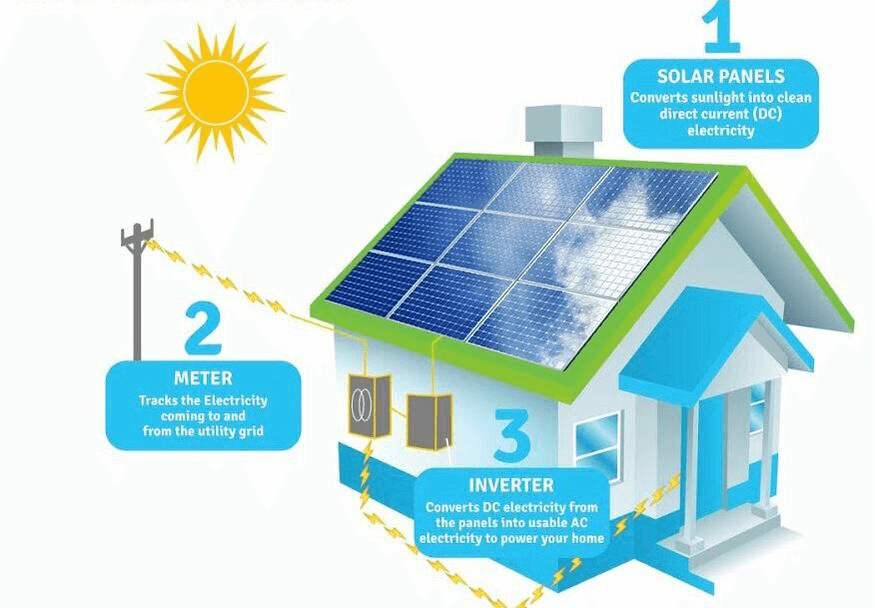How Solar Power Can Aid You Save Cash and Decrease Your Carbon Footprint
The integration of solar power right into your power profile offers a compelling opportunity for both financial cost savings and environmental stewardship. As various government motivations come to be readily available, the inquiry emerges: just how can one successfully browse the preliminary investments and ongoing advantages of solar modern technology to optimize both economic and environmental gains?
Understanding Solar Power Savings
While the shift to solar power frequently involves a first investment, comprehending solar power financial savings is essential for homeowners and organizations alike. Solar power systems can dramatically decrease electricity bills by taking advantage of the sunlight's power, equating into significant lasting financial benefits. By creating their own electricity, individuals reduce reliance on grid power, which undergoes varying rates. These cost savings can accumulate in time, commonly resulting in a quick return on investment.
Additionally, solar energy systems may qualify for numerous financial incentives, including tax obligation credit scores and refunds, further improving their cost-effectiveness. The schedule of web metering enables users to market excess power back to the grid, developing an added earnings stream. These elements add to the total savings related to solar power.

Along with direct monetary savings, solar energy offers the added advantage of boosting residential or commercial property worth. Houses furnished with photovoltaic panels are commonly more attractive to purchasers, as they promise reduced energy costs - Simply Solar Illinois. Understanding these aspects is crucial for anybody considering solar energy, as it highlights not just the potential financial gains, however likewise the more comprehensive ecological and economic benefits of adopting renewable resource solutions
First Expenses vs. Long-Term Benefits
When reviewing solar power, it is necessary to consider the preliminary prices versus the long-term advantages. The upfront investment for photovoltaic panels, installation, and associated equipment can be substantial, frequently ranging from $15,000 to $30,000, depending on the system size and home energy needs. This preliminary expenditure may prevent some house owners; nevertheless, it is vital to think about the prospective cost savings in time.
Once installed, solar energy systems can considerably reduce or perhaps eliminate regular monthly power costs, causing considerable long-term financial benefits. Researches indicate that house owners can save anywhere from $10,000 to $30,000 over the life-span of their planetary system, commonly 25 years. Furthermore, several states supply rewards, tax obligation credit ratings, and refunds that can balance out first prices, making solar extra obtainable.

Decreasing Your Carbon Footprint
Decreasing your carbon impact is an important consideration in today's eco aware society, and embracing solar power is one of the most efficient navigate here methods to achieve this goal. Solar power is a tidy, eco-friendly resource that substantially decreases reliance on fossil gas, which are significant factors to greenhouse gas exhausts.

In addition, the widespread adoption of solar innovation urges the growth of green tasks and sustains innovations in power storage and effectiveness. The even more individuals and organizations buy solar energy, the higher the collective decrease in carbon emissions, fostering a cleaner atmosphere for future generations.
Federal Government Incentives and Refunds
Embracing solar power not only benefits the environment however can likewise result in considerable monetary savings, specifically with the schedule of government motivations and rebates. Numerous government, state, and regional programs are created to motivate home owners and businesses to buy solar power systems, making the change much more economical.
One of one of the most prominent incentives is the Federal Financial Investment Tax Credit Report (ITC), which allows solar system owners to deduct a significant percent of the setup costs from their federal taxes. This reward has been pivotal in reducing the in advance expenditures related to solar power systems. In addition, many states use their own tax credit histories, gives, and rebates that can additionally improve savings.
In addition, some city governments offer real estate tax exemptions for solar setups, making certain that home owners do not deal with boosted real estate tax as an outcome of their renewable resource financial investments. Energy firms might likewise offer incentives, consisting of internet metering and feed-in tariffs, which permit solar energy users to sell excess power back to the grid.
Selecting the Right Solar System
Picking the appropriate planetary system is essential for taking full advantage of power efficiency and financial advantages. The choice hinges on a number of aspects, including energy needs, budget plan, and offered area. Homeowners must start by assessing their electrical power intake to establish the system size needed for optimal performance.
Next, think about the different kinds of solar modern technologies offered. Simply Solar Illinois. Photovoltaic (PV) panels are one discover this of the most typical, converting sunlight straight right into electrical energy, while solar thermal systems concentrate on heating water. Each type has distinctive advantages depending upon private demands
Spending plan factors to consider are additionally paramount. Initial installment costs can differ dramatically, so it's vital to contrast quotes from several carriers and explore funding choices. Federal government motivations and rebates can even more decrease the financial worry, making planetary systems a lot more available.
Conclusion
In recap, solar energy provides a sensible option for achieving substantial price savings while concurrently lessening carbon exhausts. The first financial investment, though considerable, yields significant lasting financial advantages, with prospective cost savings ranging from $10,000 to $30,000 over 25 years. The ecological benefits of solar power contribute to sustainable methods important for combating environment site adjustment. Government motivations boost the expediency of solar technology adoption, motivating a shift in the direction of a cleaner, extra financially efficient power source.